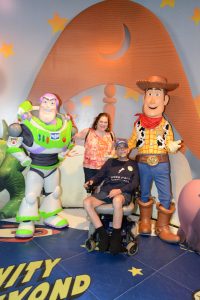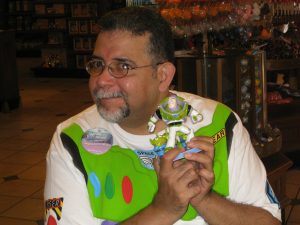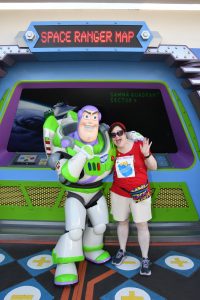Toy Story 4: Caregiving Personalities Through a Pixar Lens

July 2014, Hollywood Studios.
Toy Story 4 was released on June 21, 2019. It received mixed reviews, but that never colors my desire to see a new Disney Pixar film. I also kept to the tradition that Ben and I had of seeing the film on opening weekend, going by myself to keep the experience sentimental and to feel that I am somehow with Ben. It may be no surprised, but I loved the film. I could relate to it on many levels, particularly as a caregiver who then transitioned to grief. Also, as a lover of toys, I simply have not been able to part with some from my childhood but have passed some of them on to others who needed and will love them. I did not write about it at the time, but it has stayed on my mind, and I watched it again yesterday, finally able to commit my thoughts to paper.
At the end of Toy Story 3, Andy brings his cherished toys to sweet young Bonnie as he goes to college and starts a new chapter in his life. It was heart-wrenching for all of us who have loved the Toy Story films and yet heartwarming that Andy gave such thought and love to his decision to give his toys to Bonnie. In Toy Story 4, the toys have settled in with Bonnie, but Bonnie has told her mom that it was okay to give away her Bo Peep lamp. Woody wants to rescue Bo Peep, but Bo Peep is okay with the letting go. She bravely accepts it as part of life. Letting go and adjusting to change is a big theme in the film. It is a big theme in the life of a caregiver, too. In the film, the toys are the friends and emotional support of their child. They all approach their role as caregiver with a different perspective.
Throughout the film, we see how the toys perceive their responsibilities as caregivers, much the same as people have varied ideas of their responsibilities. Woody is the take-charge caregiver, completely devoted to Bonnie, although he still has an attachment to Andy. Woody finds his self-fulfillment in the caregiver role. He is Bonnie’s advocate, even sneaking into a backpack to secretly accompany her to kindergarten and working behind the scenes to help her get comfortable. The other toys don’t agree with what Woody considers loyalty. I can relate to hearing much advice but having to go with my gut as Ben’s caregiver. Even in the hospital, there were times that I had conversations on Ben’s behalf, defying the advice of hospital staff because I knew what Ben wanted and sometimes, what he didn’t even know he needed.
Poor Forky, the new character, hand-crafted by Bonnie, never asked to be a caregiver. He didn’t want to be responsible for a child. Woody, who is proud of and dedicated to his role as Bonnie’s caregiver, constantly needs to teach and remind Forky of how much Bonnie depends on him. Forky is in some ways oblivious, but also reluctant and ambivalent about this new role. He was happy as trash. I’m pretty sure that many caregivers can relate to this feeling, or to family members who vaguely knew they had a responsibility, or even offered to take on responsibility, but were never reliable and did not want to be held accountable.
When Woody surprisingly discovers Bo Peep, he reverts to the memories of when they were all in Andy’s home. Bo Peep still has those memories, but she maintains that she is happy to be on her own, or what is termed a “lost toy.” Bo Peep explains to Woody that she’s moved on and enjoys her freedom. Over the years, I have met many people who did feel an immediate freedom from caregiving, also relieved to be free of the bad memories of illness. They are not involved in causes related to those illnesses. I was not one of those people. I got upset when people would tell me I was free or that I had my life back. I am not judging, because everyone has their own experiences and frames of mind with regard to caregiving. I do understand wanting distance from the pain. For me, it was all tied to my identity, so giving me freedom was also taking away all that I was, or all that I saw as myself and the reflection of the people I loved and lost.
Woody does judge Bo Peep, and when she presses him on why he clings to Bonnie, and to his attachment to the memories of Andy, he finally admits that, “It’s all I have left. I don’t have anything else.” Next month will be five years since Ben left this earth and I still struggle with that feeling. So much of my identity, and even my self-esteem, was entwined in caregiving. I transitioned from caring for my dad to caring for both of them, and after losing my dad, caring for Ben, for what amounted to more than twelve years. I related so much to the caregiving experience that part of my coping with grief was starting this blog and volunteering with ALS organizations to try to support others who were caregivers. It was a way to stay loyal to Ben and my dad and to hold onto the only Abby I had known for quite a while. I could not step forward into life without carrying that part of myself. Although there were a lot of unpleasant times, it was the loving, meaningful and important part of who I was and wanted to be.

My silly Ben with his buddy, Buzz.
For Woody, everything comes down to the issue of loyalty to Andy and to Bonnie. However, his friends feel left behind. He felt they should understand his loyalty. I understand that feeling. We all define and express loyalty differently. That’s why communication is important. (click here to read my post on communication). When Ben and my dad were alive, I certainly saw my friends less and often ignored advice to do what I felt was right, even if I, myself, was not happy with the effects those choices had on me. That was how I defined loyalty. I was rarely loyal to myself, although I felt that I was simply trying to be a devoted caregiver. If you’ve read my blog, you know that sometimes it took an unnecessary toll on me. Loyalty to oneself is important, though difficult to achieve as a caregiver.
Since I lost my dad and Ben, it has been very important to maintain a feeling of loyalty to them. I still have a difficult time balancing my connection to memories with what is now a desire to embrace my life. There can still be the nagging feeling of disloyalty, even when I go to the new Disney films, because I am enjoying them without Ben. My way of coping is to give him a big presence in all that I do, but, to be honest, I know that it is self-deceptive. It sometimes keeps me in a relationship that no longer exists, despite the fact that it will always stay in my heart. For a while, I did not like to attend holiday gatherings, because I did flounder. I didn’t really want to be by myself, but it was too hard to be around others and try to look happy. And, it was hard to return home alone. Woody tells Bo Peep that she is a “lost toy” because she does not have a child, but she says that he is the one who is lost. She’s right. Bo Peep is not as happy to be free from connection as she professes, but she has at least carved out a life for herself. However, Woody is lost because his entire identity is grounded in children who grow up and pass him along (unless, of course, he ends up with someone like me!).
Buzz Lightyear has a very special place in my heart because he was always Ben’s favorite superhero and I always remember how Ben had a hard time greeting Buzz after his ALS diagnosis because Buzz was strong and Ben felt weak. Buzz made a big fuss over Ben, which always warmed my heart. In Toy Story 4, Buzz turns out to be the character who provides the voice of reason. After all, he does have the “inner voice button.” I laughed at how he kept pushing that button till he got an answer he liked. I can relate to that idea! Buzz lets Woody know that Bonnie will be fine on her own and that it’s okay for Woody to let go of her and have an identity apart from those for whom he cared. As Buzz advises, “Listen to your inner voice.” It’s not easily done. I surely pushed that button repeatedly when it came to my caregiving responsibilities. It’s taken all this time, but I am now, finally, more at ease with letting my inner voice matter. I am finally acknowledging that loyalty to their memory does not have to keep me in the throes of grief anymore. However, although I feel it less, I still grapple with the guilt of living my life. It’s an adjustment to life and how it flows. I had to be ready to rediscover myself and I had to do it in my own timeframe. I can say that once I was ready to hear my inner voice, like Woody, I let it speak more loudly, and it has guided me to a place where I can happily and wholeheartedly engage with life. I no longer feel quite as lost, though I am not exactly where I want to be. Though I’m still very tied and loyal to my memories, I also love and seek out opportunities to create new ones, and I feel proud of myself for doing so, while also keeping Ben and my dad close in my heart. I just wish I had a cool inner voice button like Buzz Lightyear’s.

Just Buzz and me in 2019- my first time back at WDW without Ben, but I know he was with us.